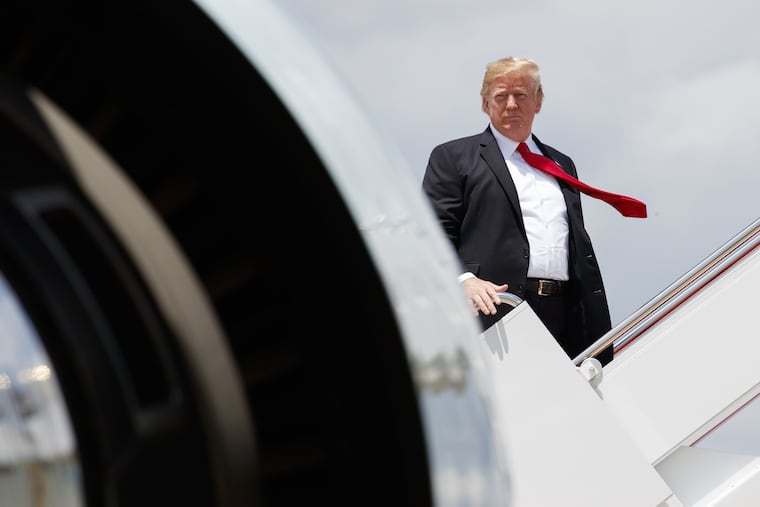What are tariffs, anyway?
The U.S. is now in the middle of a fully-fledged trade war, but how does that work?

Between steel and aluminum, agriculture, and even Harley-Davidson motorcycles, tariffs have been a constant subject of news over the past several months. And Friday, the United States put $34 billion worth of tariffs on goods imported from China, and China responded with $34 billion worth of retaliatory tariffs on U.S. items.
Now that these threatened tariffs have officially gone into effect, how do they work?
What is a tariff?
Put simply, a tariff is an import tax.
"Just like you would pay a sales tax on a good at the market or a retail store, the government is collecting a sales tax on a good," said Kevin Fandl, an assistant professor at Temple University and former chief of staff for international trade and intellectual property at U.S. Immigration and Customs Enforcement.
Steel mills in Canada exporting steel to the U.S., for example, will have to pay an import tax when the product arrives at the U.S. border, he said.
Where does the money from tariffs go?
Fandl said the money collected at the border goes to the government of the country charging the tax. While those steel and aluminum tariffs may somewhat increase business for U.S. steel and aluminum companies, they will not receive any additional financial benefit from the taxes themselves.
Who do tariffs affect?
In short, everyone.
For now, tariffs are mainly impacting those companies selling and buying taxed goods. Fandl said the manufacturing industry will "feel the brunt" of them, and the taxes are "going to hurt U.S. exporters substantially."
Still, he said, as "with any tax, it always comes back to the consumer."
In fact, Michelle Casario, an assistant professor of economics at Villanova University, said the "big loser" in a trade war is actually "the U.S. consumer." Rather than absorbing the cost of the tariffs, producers pass that cost on to people who buy finished products. Usually, she said, this particularly hurts lower- to middle-class shoppers.
"These America-first policies [that President Trump] puts forth aren't going to help because of the fact that lower-income people are going to spend a higher proportion of their income on household goods," Casario said.
Why are there new tariffs?
Fandl said Trump is using two different provisions as justification for his new tariffs: Section 301 of the U.S. Trade Act of 1974 for those he placed on imports from China, and Section 232 of the Trade Expansion Act of 1962 for those placed on Canada, Mexico, and the European Union.
With Section 301, a section devoted to stemming unfair labor practices, Fandl said, Trump is claiming that "China has been stealing intellectual property of the U.S. and therefore we have the right to retaliate against them." The taxes mainly target technology and industrial machinery in exchange for China's "stealing" U.S. technology.
The tariffs enacted with Section 232, Fandl said, are a bit more "unusual." He said Trump was invoking part of trade law that allows him to block imports that threaten national security.
"We're allowed to assess our industry — for example, the steel industry or the oil industry — and determine if imports from abroad are causing harm to that industry," Fandl said. "And if they are, then we're allowed to put tariffs up until the offending imports stop."
By using this section, he said, Trump is saying that imports, such as steel, are hurting U.S. national security.
This reasoning hasn't been used since President Jimmy Carter applied it to oil imports from Libya and Iran. Fandl said Trump's logic in doing so now "doesn't make sense at all."
What countries have implemented or are threatening to implement tariffs in retaliation?
China, Canada, Mexico, and the EU have all placed or threatened to place retaliatory taxes on U.S. products.
This creates a major problem for the U.S., Casario said, because the country is now fighting a trade war "on multiple fronts." She said the losses companies sustain from some tariffs cancel out any benefits they might receive from others.
Fandl said this retaliation is the biggest threat in a trade dispute because the U.S. has a "very globally integrated supply chain" and the EU, in particular, is "pretty good at targeting very politically charged tariffs." He noted that the industries hit hardest by the EU's tariffs, like Harley-Davidson motorcycles and bourbon, are based in Republican strongholds — House Speaker Paul Ryan's home state of Wisconsin and Sen. Mitch McConnell's home state of Kentucky, respectively.
"This is different than when you play games with Latin America or smaller Asian countries, because they don't really have the ability to retaliate," Fandl said. "But when you play games with the EU and Canada — our biggest trading partner — and China, they have the economic influence to really hurt us."